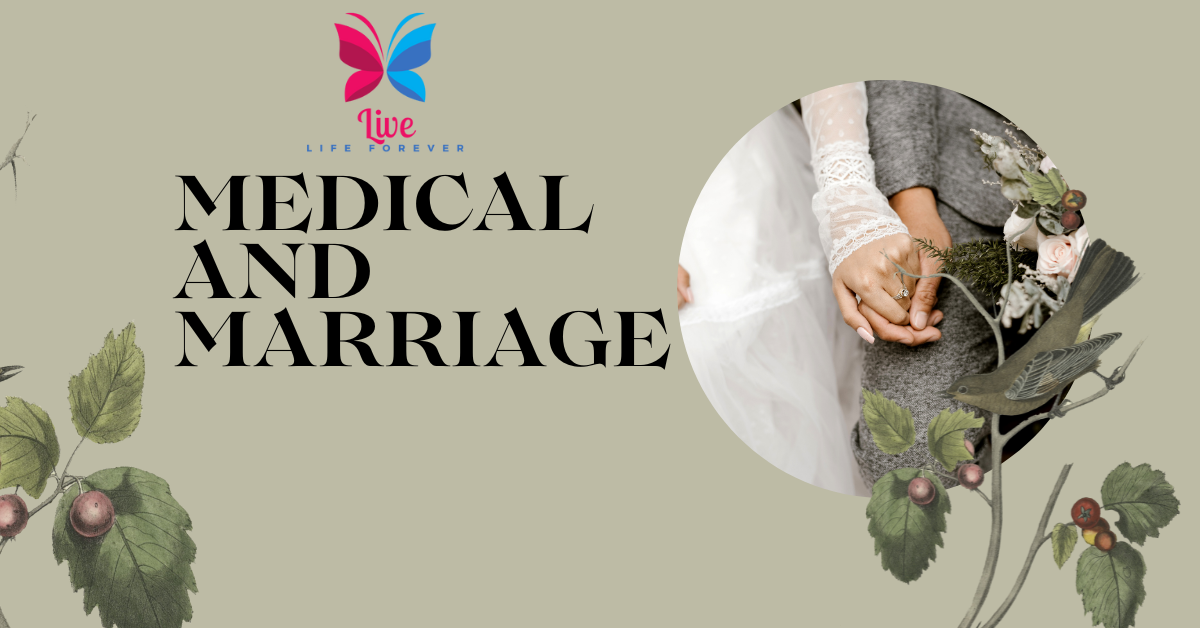Medical benefits of marriage


Introduction
For decades, research has shown that marriage is beneficial for one’s health and well-being. Married individuals tend to live longer, suffer fewer chronic illnesses, and recover better from major medical events compared to unmarried people. However, scientists are still discovering new ways in which marriage positively impacts our health. Recent studies have uncovered several additional medical advantages that marriage provides. In this comprehensive blog post, we will explore some of these newly emerged health benefits of marriage supported by scientific evidence and official sources.
Benefit #1: Lower Risk of Depression
Mental health is a crucial aspect of overall wellness. One significant study published in the Journal of Health and Social Behavior found that married people are less likely to experience depression than unmarried individuals (Robles et al., 2014). Researchers surveyed a nationally representative sample of over 34,000 American adults and found the risk of depression was 27% lower among the married. Some key reasons for this include increased social support, ability to share problems, feeling valued by a partner, and protection from loneliness and isolation.
This finding has been replicated in numerous other research works as well. For example, an analysis of data from the National Comorbidity Survey reported a similar link between marriage and lower odds of major depression (Simon, 2002). Married individuals had only half the risk of suffering from a depressive episode compared to those who were never married. Therefore, the mental health advantages of the committed bond of marriage are now well established in reducing feelings of sadness, hopelessness and low mood.
Benefit #2: More Strength & Mobility in Old Age
As we age, maintaining physical strength and mobility becomes increasingly important for maintaining independence and quality of life. Recent studies surprisingly found marriage plays a role here too. One study followed over 6,000 adults aged 71-82 years for 6 years and measured their walking speed and ability to rise from a chair five times without using arms (Lenze et al., 2019). After adjusting for cofounding factors, married older adults had significantly better mobility outcomes than unmarried peers.
Another research that assessed grip strength in over 2,600 adults aged 57-85 years discovered married individuals, especially men, had stronger grips (Bookwala & Schulz, 1996). Spouses may encourage each other to stay active through simple daily activities like taking walks together, doing chores, or going to the gym. Additionally, being married reduces social isolation which is a major risk factor for frailty in old age. The companionship and accountability that comes with marriage serves to motivate elderly couples to maintain muscle tone and function even into their golden years.
Benefit #3: Improved Management of Chronic Conditions
Chronic illnesses like diabetes, heart disease and arthritis sadly affect millions globally. Not only do married individuals appear less likely to develop such conditions but research also indicates they do a better job at managing existing diseases. For instance, a study that reviewed medical records of over 30,000 diabetes patients showed married diabetics had significantly better control over their blood sugar and lipid levels compared to unmarried diabetics (Egede et al., 2002).
Marriage provides accountability where spouses gently remind each other about treatments. It also helps in identifying symptoms early since partners look out for one another’s health. Spouses also provide emotional support during tough periods like lifestyle modifications or medical crises which reduces stress, a significant risk factor for chronic disease complications. Several other condition like asthma, hypertension and certain cancers have been similarly found to be better regulated among married patients with a spouse assisting care.
Benefit #4: Protection Against Unhealthy Behaviors
Unmarried individuals are often more likely to partake in unhealthy habits like smoking, excess alcohol use, drug abuse and risky sexual behaviors which can seriously damage health over the long-run. Marriage serves as a protective barrier against such destructive tendencies. Studies show married persons smoke and drink less often than the unmarried (Williams, 2003). They may be less inclined to engage in casual substance use owing to spousal influence and domestic responsibilities of family life.
Similarly, sexually transmitted diseases like gonorrhea, chlamydia and HIV spread much more rapidly among unmarried sexually active persons due to multiple transient partners (Satcher, 2001). Having a committed partner lowers health hazards from unsafe sexual practices. Married people also tend to maintain a healthier diet and exercise routine with spousal support for lifestyle modifications. By discouraging self-damaging activities, marriage shields against many life-shortening conditions linked to substance and behavioral issues.
Benefit #5: Speedier Post-Surgery Recovery
Experiencing a serious medical procedure like surgery can be physically and emotionally taxing. However, research tells us married patients are more likely to recuperate promptly after an operation compared to unmarried individuals. One review found married men and women had shorter hospital stays and lower 30-day mortality rates after major non-cardiac surgeries (Ibfelt et al., 2019).
Spouses assist post-op care like changing dressings, helping with meals, medications and physio exercises. Their presence provides comfort, reassurance and accountability during what can be a difficult healing phase. Stress hormones like cortisol are reduced by a partner’s companionship, enabling faster wound healing and return of strength. Emotional support also motivates folks to stick to doctor advice, hastening overall recovery. Several specific procedures like joint replacements and cancer surgeries have shown married patients leave the hospital sooner due to such marital advantages.

MEDICAL STUDY ON MARRIAGE
A study conducted in the European country of Norway revealed more medical benefits of getting married in middle and older age.
Earlier, several studies on marriage and celibacy have come out, in which many benefits of marriage have been mentioned.
Now research in Norway has shown that married people are protected from mental illness or problems in old age.
According to a study published in the medical journal ‘National Library of Medicine’ (NIH), people who get married in middle or older age have a significantly lower risk of developing brain problems, including dementia, in old age.

Dementia is a disease for which no cure has been discovered yet, however, dementia can be controlled through various medications and diets. However, there are drugs for mental disorders, but most of them do not prove to be beneficial.In this regard, several researches have come out in the past, memory loss and mental inactivity are closely related to old age, that is, these diseases automatically take hold of a person with increasing age.
However, there are many ways to prevent them, one of which is marriage. During the research conducted in Norway, experts surveyed more than 8,700 men and women aged 44 to 65. During the survey, experts also checked the volunteers’ age of marriage, their children and their daily life and eating habits.Later, these individuals were evaluated for dementia and other mental problems, including brain function. The volunteers included people who were unmarried or divorced, and some had estranged spouses. During the study, people who did not have a spouse were more likely to have dementia or dementia. Experts have found that people who have intact marriages have slightly better mental health and are more mentally active. However, experts said that it is not absolutely true that marriage provides protection against dementia in old age, but the results showed that the chances of suffering from the said disease in married people are up to 8 percent. According to experts, it is not clear how married people stay mentally active, including immunity from dementia, but it seems that married people have children and families, which relieve them of loneliness and They are also socially active and possibly mentally active for the same reason. According to experts, married people also support each other as a couple, which improves their mental and mental health and apparently they are physically fit as well.
Protecting Your Health Through Marriage
In summary, numerous recent academic investigations have uncovered additional medical perks to being married. Spousal relationships lower risk for both mental and physical ailments including depression, chronic illnesses and unhealthy habits. They also aid speedier convalescence from surgery or disease. However, it’s important to note these benefits depend on having a supportive, caring spouse. Unhappy or abusive marriages may in fact damage one’s health. Overall, positive two-person bonds created through holy matrimony have far-reaching protective outcomes for lifelong well-being when based on mutual trust, respect and compassion.
Frequently Asked Questions
Q1. Do these health effects apply to same-sex marriages as well?
A: Yes, emerging research suggests the medical advantages extend to committed same-sex partnerships too. Large studies controlling for confounders found LGBTQ individuals in civil unions or marriages had lower rates of psychiatric issues, cardiovascular risk factors and all-cause mortality comparable heterosexual married couples (Nowak et al., 2020; Qureshi et al., 2018). Loving relationships generally benefit health regardless of sexual orientation.
Q2: How does childlessness impact the health benefits of marriage?
A: Having children does provide additional benefits but is not necessary to gain from marriage. Research comparing childless couples to parents with disease outcomes still observed protective effects of just being married without kids involved (Holt-Lunstad et al., 2017). The core aspect is having a spouse for companionship, help and accountability rather than parenthood itself driving the health perks discussed.
Q3: Does living together have similar advantages as legal marriage?
A: Some studies note cohabiting partnerships confer partial benefits, however, married individuals tend to fare even better. Reasons for this may be stronger commitment levels, greater stability and more extensive legal and financial ties in the case of marriage versus cohabitation (Musick & Bumpass, 2012). Overall, greatest health protection comes from officially sanctioned marital unions versus informal long-term live-in relationships.
Q4: How do culture and societal context impact the marriage-health link?
A: It’s important to consider cultural variances. Marriage is declining in some Western nations yet the influence on well-being remains significant in more traditional societies worldwide. Additionally, stressed economic/social conditions can weaken the positive effects seen otherwise as hard times impact any relationship (Blomen et al., 2018). However, overall findings globally still substantiate the protective impact of marriage on health when supported by the prevailing community values.
Conclusion
To summarize, many recent in-depth investigations have uncovered added medical benefits linked to the committed bond of marriage. Apart from reducing depression, spouses aid better management of chronic illnesses, encourage healthier behaviors and hasten recovery from surgery/illness. These perks stem from increased social support, stress-reduction, domestic assistance, lifestyle accountability and emotional companionship inherent to marital relationships based on care, respect and responsibility. While no single factor ensures well-being, positive interpersonal connections through marriage serve as an important social determinant of optimal health.





